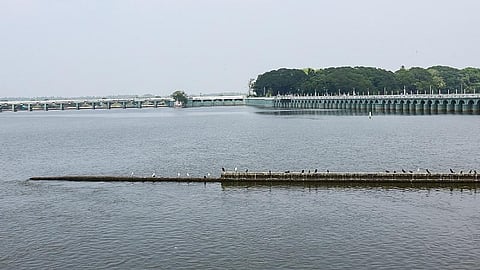

BENGALURU: Bengaluru is one of the most vulnerable cities in terms of water requirement, availability and dependence. The recent drought has raised concerns over the water situation in the state capital, with the environment department declaring there is no plan B.
“Bengaluru is largely dependent on Cauvery water that is pumped from 100km away to a height of 540 metres. Due to this, it is extremely vulnerable. Despite having a large number of sewage treatment plants (STPs), utilisation of water from these units is low.
Lake water is also not being consumed. With the effects of climate change being noted, the government and people should look at a plan B for alternative sources of water,” a senior official from the environment department told TNIE.
Department officials pointed out that a large number of apartments and commercial establishments purchase water in tankers on a daily basis. The situation is worse in the city outskirts.
Bangalore Water Supply and Sewerage Board (BWSSB) Chairman Ramprasath Manohar said there are 33 functioning government STPs in the city, pumping 340 MLD. It has also been proposed to construct 24 more STPs.
Another BWSSB official said the city gets 1450 MLD of Cauvery water. Bengaluru will get 775 MLD under Cauvery Stage-5, which will be pumped to 110 villages in the suburbs. The city also utilises 700-750 MLD groundwater. BWSSB has written to Cauvery Neeravari Nigam to reserve 1.6 tmcft of water every month till March, and 2.42 tmcft from April to meet Bengaluru’s needs.
According to the Karnataka State Pollution Control Board (KSPCB), 302 applications by private establishments were cleared for setting up STPs in the past two years. According to BBMP, there are 210 lakes in the city, with a water holding capacity of over 1 tmcft.
Shreya Nath, managing partner, Urban Water Programme, WELL Labs, said Bengaluru has the highest number of decentralised STPs. As per the KSPCB master list, around 3,500 STP applications were made and their validity is being assessed.
She added that Chennai has around 1,000 STPs, Hyderabad 800 and Pune 600. Bengaluru has the highest number as it has mandated the installation of STPs in apartment complexes of over 20 units, and the use of treated water.
WELL, Labs is assessing the condition of STPs. She pointed to the Composite Water Management Index report of NITI Aayog of 2019 and said that Bengaluru falls under the overexploited category.